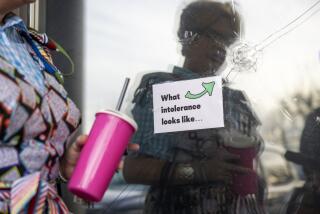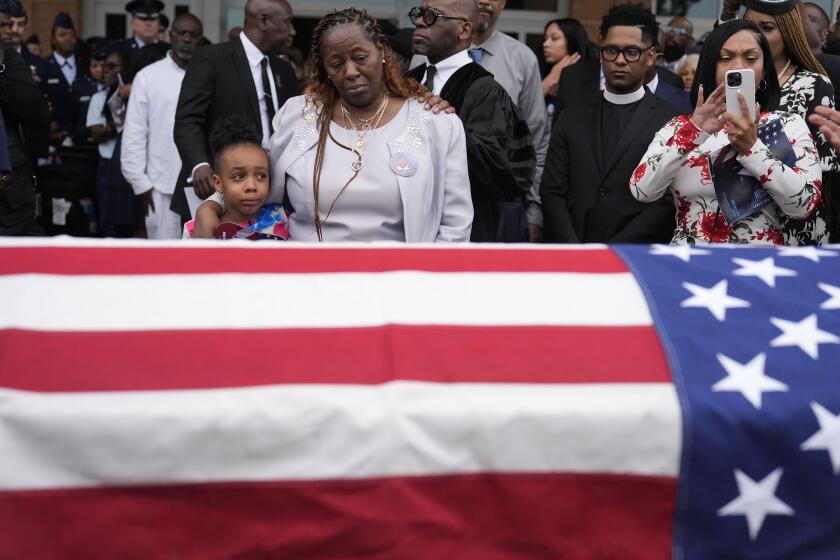Doctors Make ‘House Calls’ to a City’s Homeless
On the doorstep of a homeless shelter in the Bronx, Corinthians Holmes is conducting an inventory of her children and their symptoms for the doctor.
“She’s coughing,” the mother says, pointing at her puffy-eyed daughter in a stroller. Turning to her two small sons: “He’s coughing . . . and he’s coughing.”
Holmes, 33, is a recovering crack-cocaine addict with 10 young children. The family has no permanent home. But the family’s doctor still makes house calls--in a 30-foot blue bus.
The bus is what the Children’s Health Project calls a “mobile medical unit.” The project’s founding benefactors, including pop star Paul Simon, launched the first mobile unit 10 years ago in hopes of helping children at shelters until the city’s homeless crisis eased.
“I always thought of the mobile units as a stopgap,” says Dr. Irwin Redlener, who heads the nonprofit effort, which is affiliated with Montefiore Medical Center and Albert Einstein College of Medicine. “I guess 10 years isn’t a stopgap.”
Today, six custom-built buses--the last one cost $150,000--serve 14 shelters in the Bronx, Manhattan, Brooklyn and Queens. There’s a staff of nine pediatricians and a $10-million budget.
Offshoot programs have been established in Washington, D.C.; Los Angeles; Newark, N.J.; Dallas and the rural South. The Children’s Health Project treated 4,224 patients in 1990. Last year, the total reached 7,205, Redlener says.
Doctors speak of families keeping scruffy cats in shelter rooms to scare off rats--nightmare conditions for kids with asthma.
They tell of parents street-dealing baby formula given to them by medical workers while letting their infants go hungry, and of drug-addicted or AIDS-afflicted mothers barely able to care for themselves, let alone their small children.
“Some of these kids look like they’ve been through a war,” says Dr. Shawn Bowen, a pediatrician. “There are so many people who have nothing, and there are so many children who have less than nothing.”
Bowen, 31, along with another doctor, nurse, medical student and two assistants, was aboard Mobile Medical Unit VI one weekday when it pulled up in front of a shelter in the South Bronx.
Among the first patients were three young brothers, each skinny and listless. Their mother, asked what she feeds her children, answered sheepishly: “Sometimes some pizza, and maybe Chinese.”
Bad diets, little or no immunization and the stresses of a nomadic lifestyle are making more homeless children susceptible to advanced forms of anemia, asthma, ear infections and skin disorders, the doctors-on-wheels say.
Advocates for the homeless blame the city for perpetuating some of the health problems.
Children are the pawns of new policies requiring stricter screening of people seeking temporary homes in city shelters, says David Greenberg, spokesman for the Coalition for the Homeless.
“You have homeless people--some of them with very sick kids--being told that they’re not homeless,” Greenberg says. “The kids are the ones who pay.”
Officials counter that the city is merely trying to make sure each family in the shelter population--currently about 17,000, including 10,000 children--truly needs costly emergency housing. Poverty, not the shelter system, is hazardous to children’s health, they say.
“There’s no easy solution,” admits Redlener. “I don’t think [Mayor Rudolph] Giuliani wants children to suffer. You’re talking about human beings trying to manage something that’s out of control.”
Doctors insist on regular checkups. The project arranges car service for patients needing the care of a specialist. Follow-up appointments are made, and many parents -- keep them.
Even Corinthians Holmes.
“You don’t look so stressed out today,” Bowen tells Holmes as she steadies her 15-month-old daughter, Sielina, on an examination table. After finding swelling in the girl’s lymph nodes, Bowen orders a tuberculosis test as a precaution and prescribes antibiotics.
Outside, Holmes describes kicking her crack habit 10 years ago after social workers took her four children away.
“I wanted to get help; I hated myself,” she says. The experience, she adds, made her a better mother. “I’m going to take care of my kids,” she says. “I’m going to make certain they see this doctor.”
More to Read
Start your day right
Sign up for Essential California for news, features and recommendations from the L.A. Times and beyond in your inbox six days a week.
You may occasionally receive promotional content from the Los Angeles Times.






